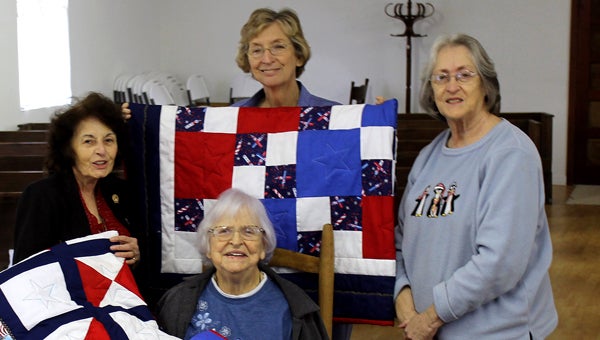Stitches of kindness
Published 8:20 pm Friday, February 14, 2014

Members of the Elizabeth Bashinsky Chapter of the United Daughters of the Confederacy in Troy made quilts for five surviving Navajo code talkers who served their country during World War II. Seated, Virginia Richburg. Standing from left, Carol Glayre, Rita Moore and Dianne Brown, chapter president.
For several years, the Elizabeth Bashinsky Chapter of the United Daughters of the Confederacy in Troy has participated in the Christmas Stockings project for the Native Americans of the Southwestern United States.
In 2013, volunteers around the country stuffed more than 1,200 Christmas stockings for Navajo Elders and children. The local UDC Chapter did its part in helping make Christmas special for the Navajos but the chapter members wanted to do more.
Carol Glayre said the Elizabeth Bashinsky Chapter UDC found a way through the Adopt-A-Native-Elder (ANE) program.
Glayre said the ANE’s network grew around the vision of supporting the traditional Elders.
“At first, only a few people on all-terrain vehicles made their way into the remote areas of northern Arizona,” Glayre said. “Soon others became aware of the plight of the Native Elders. Now, more than 2,500 people from the United States and other countries have joined in the spirit of the Giveaway Circle.”
ANE supports more than 500 Elders who live on the Navajo reservation in northern Arizona and southern Utah.
Glayre said the focus of the program is to help the Elders live on the land in their traditional ways, as they did for hundreds of years.
“The Navajo people serve as area coordinators and help determine the Elders’ needs.
“There are several ways that clubs, organizations and individuals can participate,” Glayre said. “Of course, there are many volunteer opportunities for those who live in the areas. But, for others, there’s the Adopt-A-Native-Elder program through which you provide the Elder with a couple of food boxes during the year. The ANE sponsors an annual Rug Show in Park City, Utah that features traditional weavings made by the Elders and their families.”
The Rug Show lasts just a few days but the ANE has a rug catalog that makes the weavings available to those who can’t attend the show, Glayre said.
The Elizabeth Bashinksy Chapter UDC members considered doing something special for the Native American Elders and learned that one way to honor the Elders is to give them blankets.
Glayre said the blankets could be given in memory of someone or on behalf of a loved one.
The members of the local UDC decided to make a quilt that would honor one of the Navajo code talkers from World War II. The quilt would be made from the scraps from the Chapter’s Christmas stocking project.
“As we began to inquire, we learned that there are actually five Navajo code talkers still living. They are all over 90 years old,” Glayre said. “We made the decision to make a quilt for each of them as a way of saying ‘thank you for your service.’ The Navajo code talkers made significant contributions to the Allies during World War II. They helped us win the war.”
Glayre said according to what she learned, a civil engineer from Los Angeles was the one who proposed the idea of using Navajos as code talkers.
“The man’s name was Philip Johnston. He was the son of a missionary to the Navajos and was raised on the Navajo reservation,” she said. “He knew the Navajo language which was unwritten at that time. He knew that the language would be an undecipherable code.”
Glayre said it was demonstrated that the Navajos could encode, transmit and decode a three-line English message in 20 seconds compared to the 30 minutes it took machines.
Johnston’s suggestion proved to have merit and the commanding general of the Amphibious Corps, Pacific Fleet recommended the Marines recruit 200 Navajos. The first Navajo Marine recruits attended boot camp at Camp Pendleton in California in May 1942.
In Glayre’s research, she found that during the first two days of the Battle of Iwo Jima, six Navajo code talkers worked around the clock sending and receiving messages. More than 800 messages were sent without an error.
Major Howard Connor, 5th Marine Division signal officer said that were it not for the Navajos, the Marines would never have taken Iwo Jima.
The Elizabeth Bashinsky Chapter UDC believed the Navajo code talkers who are living today should be honored and, in so doing, bring honor to all Native American code talkers.
Glayre said the handmade quilts – gifts to the Navajo Code Talkers – will be presented to each of them by representatives of the ANE.
The UDC members will not be in attendance but they will be there in spirit and with deep appreciation for the Native American Elders’ service to their country.




